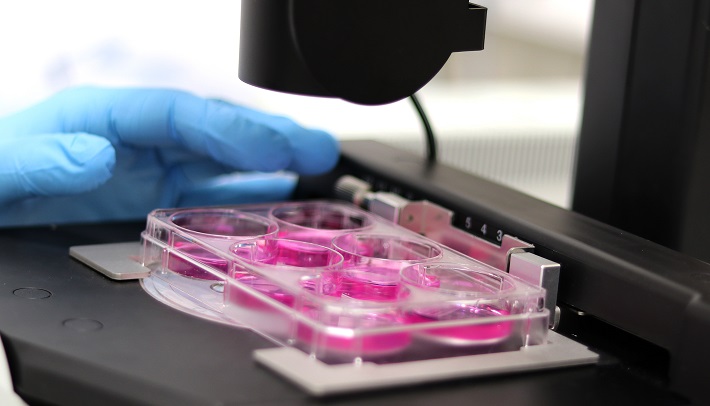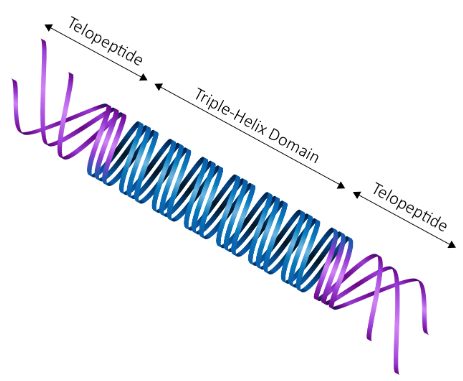
Collagen I for Cell Culture Research Applications
Collagen, a fundamental protein abundantly found in the extracellular matrix (ECM) of tissues in humans and animals, plays a crucial role in providing structural integrity and support for cells. There are multiple types of collagen, with Collagen Types I, II, III, and IV being the most common in connective tissues, including skin, tendons, and bones.
Collagen Origins: Bovine, Rat, and Human Sources Available
All collagen products we offer are for research use only and sourced from:
- bovine skin, exclusively obtained from a controlled, closed herd in the U.S.
- human cell culture neo-natal fibroblasts, which produce the naturally human collagen.
- rat tail tendons, a popular source for high-purity collagen in laboratory settings.
Type I Collagen
Among the different types, Type I Collagen is the most prevalent and commonly used in cell culture studies. It forms robust fibers that are ideal for mimicking the natural ECM, making it a preferred choice for tissue engineering, wound healing studies, and regenerative medicine.
Different Extraction Methods of Collagen and their unique properties: Atelo- and Telocollagen
Collagen can be isolated through two distinct extraction methods, each affecting its structure and function in different ways.

- Acid extraction: This method typically yields Telocollagen, which retains the telopeptides—short peptide sequences at the ends of the collagen triple helix. It has stronger cross-linking potential and forms 3D hydrogels more quickly and with greater strength than Atelocollagen. This makes it suitable for applications requiring robust structural integrity.
- Enzymatic extraction: This method removes the telopeptides, producing Atelocollagen. The absence of telopeptides makes it easier to solubilize, which is beneficial for applications like cell culture coatings and hydrogel formation.
Applications in Cell Culture and Bioengineering
Isolated collagen, especially Type I, has versatile applications in biomedical research:
- 2D Coatings: Collagen is often used to coat culture dishes, providing an adhesive surface that promotes cell attachment and growth, particularly for anchorage-dependent cells.
- 3D Hydrogels: Collagen hydrogels mimic the ECM and provide a three-dimensional environment for cell cultures, enabling more physiologically relevant studies of cell behaviour, drug responses, and tissue development.
- Bioprinting: Collagen-based bioinks are used in bioprinting to create tissue constructs that closely resemble the architecture of natural tissues.
- Cell and Drug Delivery: Collagen can be used as a carrier for delivering cells or therapeutic agents, enhancing their stability and bioavailability.
| Source | Format & Concentration | Atelo-/Telo-collagen | Product name and Catalogue number |
|
2D Coatings, 3D Hydrogels, Cell Assays |
|||
| Bovine Skin | Solution (3 mg/ml) | Atelo | PureCol® Solution #5005-100ML |
| Solution (6 mg/ml) | Atelo | Nutragen® Solution #5010-50ML | |
| Solution (10 mg/ml) | Atelo | FibriCol® Solution #5133-20ML | |
| Solution (3 mg/ml) | Telo | TeloCol®-3 Solution #5026-50ML | |
| Solution (6 mg/ml) | Telo | TeloCol®-6 Solution #5225 | |
| Solution (10 mg/ml) | Telo | TeloCol®-10 Solution #5226 | |
| Human Fibroblast Culture | Solution (3 mg/ml) | Atelo | VitroCol® Solution #5007-20ML |
| Rat Tail Tendon | Solution (4 mg/ml) | Telo | RatCol® Solution for 3D Hydrogels #5153-1KIT |
| Solution (~10 mg/ml) | Telo | High Concentration Rat Tail Collagen 10 mg/mL #HCRTC-100MG | |
|
3D Bioprinting |
|||
| Bovine Skin | Bioink (35 mg/ml) | Atelo | Lifeink® 200 Type I Collagen Bioink #5278-5ML |
| Bioink (70 mg/ml) | Atelo | Lifeink® 220 Type I Collagen Bioink #5343-4ML | |
| Bioink (35 mg/ml) | Atelo | Lifeink® 240 Acidic Type I Collagen Bioink #5267-5ML | |
| Bioink (70 mg/ml) | Atelo | Lifeink® 260, Acidic Type I Collagen Bioink #5358-4ML | |
Related Products:
| Product name and Catalogue number | Application |
| Collagenase #5030-50MG | Collagenase for efficient cell isolation from collagen gels, designed to enhance the viability and functionality of isolated cells. |
| Collagen-Hybridizing Peptides (CHP): CHP 5-FAM Conjugate #5264-60UG CHP Biotin Conjugate #5265-60UG CHP Cy3 Conjugate #5276-60UG |
CHP is a synthetic peptide that specifically binds to denatured collagen strands via hydrogen bonding. Available in various conjugates for fluorescent imaging, it is versatile for use in histology, in vivo studies, and in vitro 3D cell culture, enabling the detection and visualization of denatured collagen. |

